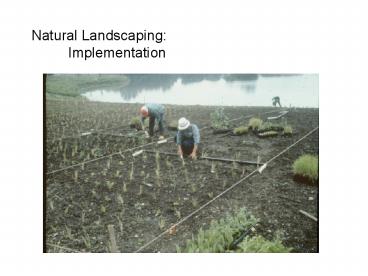Natural Landscaping: Implementation - PowerPoint PPT Presentation
1 / 30
Title:
Natural Landscaping: Implementation
Description:
Natural Landscaping: Implementation – PowerPoint PPT presentation
Number of Views:33
Avg rating:3.0/5.0
Title: Natural Landscaping: Implementation
1
Natural Landscaping Implementation
2
Site Inventory and AnalysisSelection of Plant
MaterialsPlanting PlanSite PreparationPlanti
ngMonitoring and Managing Early Stages
3
Site Inventory and Analysis
4
CREATE A SITE PLAN Create a conceptual design
5
To Choose SpeciesStart with list of desired
design components and select species to represent
each, based on availability Bloom Time Flower,
Fruit, Foliage Color Texture Height,
Spread Family Species Associations
6
LOCATE SOURCES OF MATERIALS Ecotypes Seed vs.
Seedlings
7
Type and Source of Materials Origin Ecotype
Dilemma
8
Specify Type of MaterialsSeeded Plantings (Most
often done with prairies, savannas)Hard to
control placement, but results are
naturalSlow results -- first year prairie
plants set down roots, most above-ground growth
is weeds by second growing season, several forbs
may flower-- brown-eyed Susan, yellow coneflower,
often native volunteers such as daisy fleabane
make quite a show by third season, grasses begin
to come into their ownCheap to purchase, may be
able to collect from wildSurvivors well-adapted
to site
9
Plantings using seedlings/transplants (Woodland
wildflowers most often planted this way as are
smaller prairie plantings)Placement of
different species easy to controlRelatively
Fast -- can expect many species to bloom the
first year may take 2 to 3 years for the
planting to fill inCan be relatively expensive
to purchase plants from nurseriesMay require
care (depends on season, dormant or not),
especially frequent watering
10
If use seedStart with list of desired design
components and select species to represent each,
based on availabilityTo figure planting mix,
need to determineAmount of seed per area (40 -
60 seeds per square foot)Number of seeds per
unit weight for each speciesProportion of mix
for each speciesGermination percentages for
each species
11
Seed Preparation StepsStratificationScarificat
ionAddition of Inoculants
12
If use seeds Use seed mixes containing a number
of species Use one mix for entire site or
separate mixes by microclimate, seed type,
life form, or successional stage Generally
plant in early spring or fall some seeds best
planted immediately after harvest
13
If use plants or seedlingsShow locations of
major design components (grasses, spring blooming
forbs, white flowers, short plants, etc.) on
sketch of planting bedUsing Design Model, and
site and species information, select species to
represent each design componentFigure at least
1 plant per square foot on average
14
List desired species and their desired
proportionsDetermine locations of individual
plants or seed mixes
15
(No Transcript)
16
Prairie Design Model Vista
- Used in relatively large spaces meant to be
viewed from a distance - Use only a few species, but with a range of bloom
times - Use 90 grass plants for every 10 forb plants
- Arrange forbs in monospecific groups -- drifts
17
(No Transcript)
18
(No Transcript)
19
(No Transcript)
20
Prairie Design Model Close-Up
- At least twice as many species as Vista Model
- 50 to 70 grasses 30 - 50 forbs
- Choose forbs so that 1/4 bloom in spring, 1/2 in
summer, 1/4 in fall - Choose at east 1 species from the leading
Families
21
(No Transcript)
22
(No Transcript)
23
Purpose of Site Preparation
- Manage/deplete undesirables
- Create good planting medium
- Ameliorate environment
24
Site Preparation Techniques
- Mulch
- Till
- Burn
- Strip
- Herbicide
25
(No Transcript)
26
(No Transcript)
27
(No Transcript)
28
(No Transcript)
29
(No Transcript)
30
(No Transcript)































